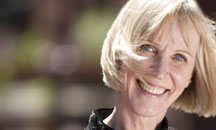I've been a full-time writer for about twenty years. (Yes: do the math. I wrote quite a bit before getting published.) I was a book editor before that, thinking that "some day" I would write my own book. When I turned forty—yes, I'm over sixty now—I realized that "some day" might well be never if I didn't actually begin to...well: write.Tell us about your writing process.
Didn't Michelangelo say something about creating David by cutting away what David was not? The process of creating historical fiction is like that. I begin with a wealth of history, as teeming in facts and fancy as daily life, and slowly, over may drafts, cut it away to reveal the essential story.Your female characters are so multi-dimensional and engaging. How much of yourself do you infuse into them?The first thing I do is go through the timeline from my main character's perspective. (See my post "On research.") I note all the events that seem significant. Then I begin to prune, taking out side-paths. One can't include everything. The important thing is to look for the arc of a story.
(I think they infuse me.)
It takes countless drafts to reveal a character's emotional reality: What was it really like for her? How did she feel? Often it's not until I delve into the details of a scene that the emotional reality becomes apparent. For example, in Mistress of the Sun, the birthing scene at Vincennes was abstract, emotionally distant until I researched 17th century midwifery. The details made it possible for me to feel the scene.
In terms of creating multi-dimensional characters—this, too, is something that develops over time, through all the many drafts. A character may be quite wooden and one-dimensional in early drafts, and then slowly begin to round out, to flower.
Which famous woman throughout history do you find the most remarkable?
I am most interested in women who are plunged into a role for which they were not raised and are ill-prepared. Josephine, daughter of impoverished nobility, becomes Empress. Louise, a devout, rustic, tomboy daughter of minor nobility becomes the Sun King's official mistress. I think I'd likewise be interested in the story of a princess turned pauper.
Joan of Arc truly was remarkable—but there would have to be something about her that provokes my curiosity for me to be drawn to write about her. "Remarkable" is not enough to make a good story—there has to be more, at least for me. I'm very fond of La Grande Mademoiselle, the Sun King's cousin, for example, a bumbling early feminist who completely (and foolishly) lost her head to love. Athénaïs interests me, as well. What made her turn to the Devil?

No comments:
Post a Comment